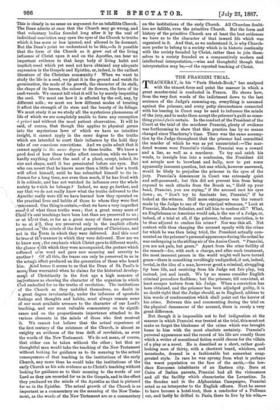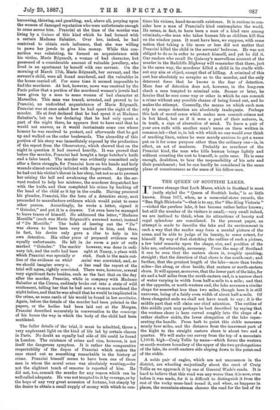THE FRANZEN' TRIAL.
THAOKERAY, in his "Paris Sketch-Book," has analysed -I- with the utmost force and point the manner in which a great murder-trial is conducted in France. He shows how, from the very first words of the indictment down to the last sentence of the Judge's summing-up, everything is assumed against the prisoner, and every petty circumstance connected with his bearing in Court may be used to influence the minds of the jury, and to make them accept the prisoner's guilt as some- thing prima-fade certain. In the conduct of the President of the Court at the trial of the murderer Pranzini, plenty of evidence was forthcoming to show that this practice has by no means changed since Thackeray's time. There was the same assump- tion by the Judge throughout that the prisoner had committed the murder of which he was as yet unconvicted The mur- dered women were Pranzini's victims. Pranzini was a coward and a liar, as well as a murderer. To try and catch his words, to inveigle him into a confession, the President did not scruple now to browbeat and bully, now to put some apparently innocent question, but one which, however answered, would be likely to prejudice the prisoner in the eyes of the jury. Pranzini's demeanour in Court was extremely quiet and self-possessed; but this did not prevent him from being
exposed to such attacks from the Bench as, "Hold up your bead, Pranzini, you are crying," if the accused cast his eyes down ; or, " Don't try to fascinate her, Pranzini," if he looked at the witness. Still more outrageous was the remark made by the Judge to one of the principal witnesses, "Look at Pranzini, Madame Sabatier, and tell him to confess all." What, an Englishman or American would ask, is the use of a Judge, or, indeed, of a trial at all, if the prisoner, before conviction, is to be thus adjured to confess his crime P Nor was this all. Not content with thus charging the accused openly with the crime for which he was then being tried, the President actually com- mented on the prisoner's personal appearance during the ordeal he was undergoing in the stifling air of the Assize Court. " Pranzini, you are not pale, but green." Apart from the utter futility of the remark—for, with such a charge, and after such treatment, the most innocent person in the world might well have turned green—there is something revoltingly undignified, if not, indeed, brutal, in the idea of a man, however great a criminal, struggling kr bare life, and receiving from his Judge not fair play, but instead, jest and insult. We by no means consider English criminal procedure faultless ; but the prisoner, till convicted, at least escapes torture from his Judge. When a conviction has been obtained, and the prisoner has been adjudged guilty, it is no doubt right that the Judge should, as in England, address to him words of condemnation which shall point out the horror of his crime. Between this and commenting during the trial on the physical demeanour of the accused, there is surely a very great difference.
But though it is impossible not to feel indignation at the manner in which Pranzini was treated at the trial, this must not make us forget the blackness of the crime which was brought home to him with the most absolute certainty. Pranzini's personal appearance and the record of his life are exactly those which a writer of sensational fiction would choose for the villain of a play or a novel. He is described as a short, rather good- looking man of thirty, with a chestnut beard, whiskers, and moustache, dressed in a fashionable but somewhat exag- gerated style. In race he was sprung from what is perhaps the worst population on the face of the earth,—the low-
class European inhabitants of an Eastern city. Born at Cairo of Italian parents, Pranzini had all the viciousness
and all the facility which characterise the Levantine. In
the Soudan and in the Afghanistan Campaigns, Pranzini acted as an interpreter to the English officers. Next he seems
to have become a hotel-tout, then a conductor of a Pullman car, and lastly he drifted to Paris, there to live by his wits,—
borrowing, thieving, and gambling, and, above all, preying upon the women of damaged reputation who were unfortunate enough to come across him. Pranzini at the time of the murder was living by a liaison of this kind which he had formed with a certain Madame Sabatier. Over her, indeed, he had contrived to obtain such influence, that she was willing to pawn her jewels to give him money. While this con- nection was subsisting, he formed an acquaintance with his victim, Marie Regnault, a woman of bad character, but possessed of a considerable amount of valuable jewellery, who lived in an apartment by herself with one servant. On the morning of March 17th, Marie R4guault, her servant, and the servant's child, were all found murdered, and the valuables in the house carried off. For some time it seemed impossible to find the murderer. At last, however, news was received by the Paris police that a portion of the murdered woman's jewels had been given by a man to some women of bad character at Marseilles. This man was traced, arrested, and proved to be Pranzini, an undoubted acquaintance of Marie Rdgnault. Pranzini was at once asked how he had spent the night of the murder. He at first declared that he had spent it at Madame Sabatier's, but on her declaring that he had only spent a part of the night there, he appears first to have said that he would not answer, as it would incriminate some one whose honour he was resolved to protect, and afterwards that he got up and walked on the outer boulevards. The absurdity of this portion of his story was immediately exposed by the production of the report from the Observatory, which showed that on the night in question it had snowed heavily. It was proved that before the murder, Pranzini had bought a large butcher's knife and a false beard. The murder was evidently committed only after a fierce struggle, for Pranzini bore on his hands and body wounds almost certainly inflicted with finger-nails. Apparently he had cut his victim's throat in her sleep, but not so as to prevent her seizing the bell and awakening the servant. As the ser- vant rushed to help her mistress, the murderer despatched her with the knife, and then completed his crime by hacking off the head of the child as it lay in the cradle. Having procured his plunder, Pranzini, like the hero of a detective story, next proceeded to manufacture evidence which would point to some other person. Accordingly, he wrote a letter, signed it " Geissler," and put it in a drawer. Yet even here he managed to leave traces of himself. He addressed the letter, " Madame Montille" (such was Marie Rdgnault's assumed name), instead of "De Montille." The habit of leaving out the " De " was shown to have been very marked in him, and thus, in fact, his device only gave a clue to help in his own detection. His other piece of prepared evidence was equally unfortunate. He left in lie room a pair of miffs marked " Geissler." The markir however, was done in ordi- nary ink, and the cuffs had been tight at Nancy, a place with
which Pranzini was specially cr cted. Such is the main out- line of the evidence on which .nzini was convicted, and, as
we should imagine every o. 10 has read the report of the
trial will agree, rightly convicted. There were, however, several very significant facts besides, such as the fact that on the day after the murder, Pranzini, while in company with Madame Sabatier at the Circus, suddenly broke out into a state of wild excitement, telling her that he had seen a woman murdered the night before, and that he was afraid that he would be implicated in the crime, as some cards of his would be found in her secrelaire. Again, before the details of the murder had been printed in the papers, or the bodies had been laid out at the Morgue, Pranzini described accurately in conversation to the concierge of his house the way in which the body of the child had been mutilated.
The fuller details of the trial, it must be admitted, throw a very unpleasant light on the kind of life led by certain classes in Paris. No doubt an equally bad side of life could be found in London. The existence of crime and vice, however, is not itself the dangerous symptom. It is rather the comparative respectability of the dupes of Pranzini which makes the case stand out as something remarkable in the history of crime. Pranzini himself seems to have been one of those men in whom the moral sense was absolutely wanting,—for not the elighteet touch of remorse is reported of him. He did not, too, commit the murder for any reason which can be well called adequate. He was not tempted to it by revenge, or by the hope of any very great accession of fortune, but simply by the desire to obtain a small supply of money with which to con- tinue his vicious, hand-to-mouth existence. It is curious to eon- eider how a man of Pranzini's kind contemplates the world. He seems, in fact, to have been a man of a kind rare among criminals,—the man who takes human life as children kill flies on the window pane. It must have been, we suppose, with some notion that taking a life more or less did not matter that Pranzini killed the child in the servants' bedroom. He was not obliged to do so in order to protect himself, and yet be did it. Our readers who recall De Quincey's marvellous account of the murder in the Radcliffe Highway will remember that there, just in the same way, the murderer killed a child in its cradle with- out any aim or object, except that of killing. A criminal of this sort has absolutely no scruples as to the murder, and the only deterrent force that he knows is the fear of detection. Mere fear of detection does not, however, in the long-run check a man tempted to criminal acts. Sooner or later, he fancies that he sees some way or other in which he can commit a crime without any possible chance of being found out, and he makes the attempt. Generally, the means on which such men rely to escape detection are absolutely inadequate. Perhaps this lack of moral sense which makes men commit crimes not in hot blood, but as if it were a part of their natures, is, in truth, a sign of aberration of mind. To leave a pair of your own cuffs with another man's name on them written in common ink—that is, in ink with which no one would ever think of marking linen, unless he were merely anxious to get a name put on it for some purpose other than the ordinary one—is, in effect, an act of madness. Probably no murderer of the Pranzini kind, the man who kills human beings lightly and without counting the cost to himself, is quite sane. He is sane enough, doubtless, to bear the responsibility of his acts and their punishment ; but he can hardly be considered in the same plane of consciousness as the mass of his fellow-men.



































 Previous page
Previous page